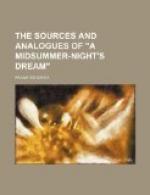It will have been observed that the tale of Orfeo varies considerably from the classical tale of Orpheus; but this is not surprising; no one can imagine that it comes direct from the classics. A French original is presumed; indeed, there are references in early “lais” to a “Lai d’Orphey,” indicating the existence of a poem which was probably the original of our King Orfeo. This original is presumed to have been a Breton lay, one of the many that were popular in the eleventh and twelfth centuries, and the English version may have been taken from the supposed source through a French form.
Now, these Breton lays were chiefly on Celtic subjects, and placed their scenes in the Celtic realms of Great Britain, Little Britain, Ireland, or Scotland. The bards of Armorica doubtless picked up a good story wherever they could find it; and the classical story of Orpheus and Eurydice would appeal strongly to Celts, who have always been famous for harping. But why should these early Celtic singers have made such changes in the story, unless they had a similar story of their own which was confused with it? The parallel story has been adduced by Professor Kittredge[73] from an Irish epic tale, The Wooing (or Courtship) of Etain. The portions of the story which concern us here follow.
Eochaid Airemm, king of Ireland, found him a wife in Etain daughter of Etar in the Bay of Cichmany, and with her Mider of Bri Leith (a fairy chief) was in love. On a summer’s day, as the king sat on the heights of Tara beholding the plain of Breg, a strange young warrior appeared, gave his name as Mider, and challenged Eochaid to a game of chess for a wager. Many were the games they played, and at first Eochaid won, and bade Mider carry out certain tasks. But at last Eochaid was defeated, and Mider for his reward asked to be allowed to hold Etain in his arms and kiss her. Eochaid put him off for a month; at the end of which time he called together the armies of Ireland, and took Etain into the palace, and shut and locked the doors, and ringed the house with guards. Yet at the appointed hour Mider stood in their midst, fairer than ever; and he sang to Etain:—
“O fair-haired woman, will you come with me into a marvellous land wherein is music, where heads are covered with primrose hair and bodies are white as snow? There is no “mine” or “thine” there; white are teeth, and black are eyebrows, and cheeks are the hue of the foxglove, and eyes the hue of blackbirds’ eggs.... We see everything on every side, yet no man seeth us. Though pleasant the plains of Ireland, yet are they a wilderness for him who has known the great plain.”
But Etain would not go to him, before Eochaid was willing to resign her. And the king would not, yet allowed Mider to embrace her before him. Mider took his weapons into his left hand, and Etain with his right, and bore her away through the skylight. The guards outside beheld two swans flying, and they flew towards the elf-mound of Femun, which is called the Mound of the Fair-haired Women.




